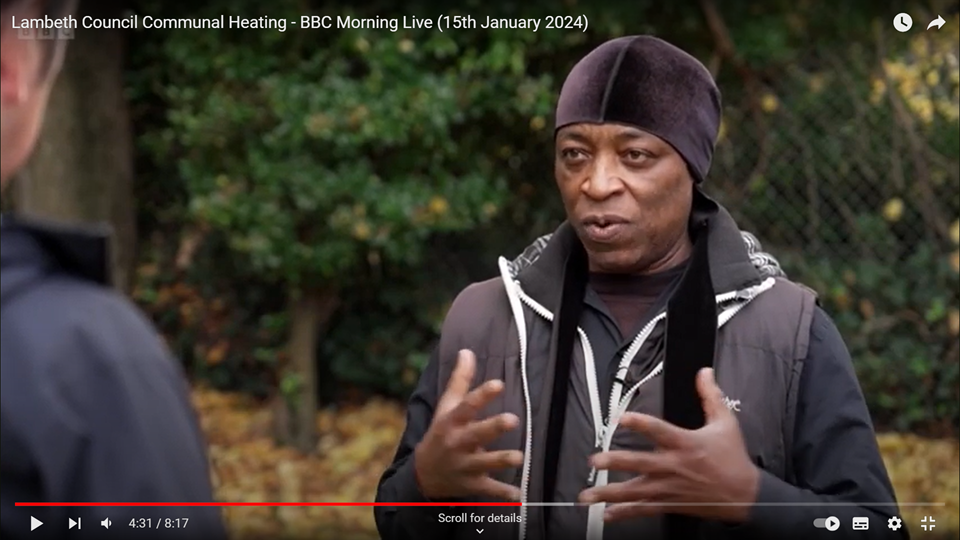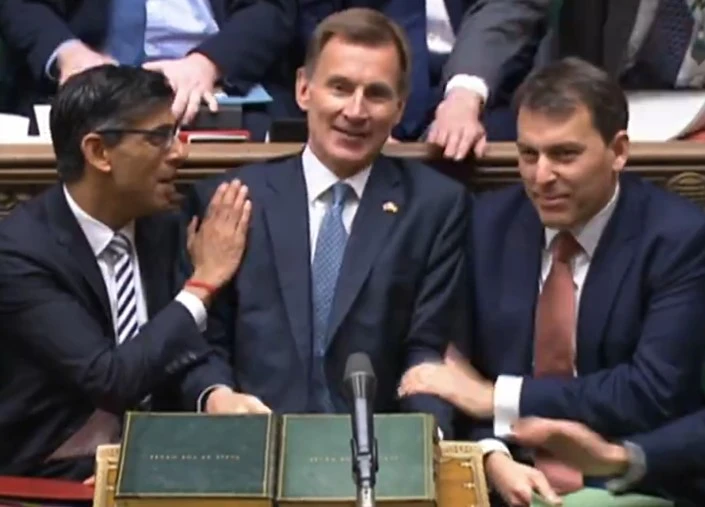Background to a nightmare
A lot of Lambeth council tenants (about 3500 properties) live on estates with a heat network – a communal heating system that works like central heating for the whole building or the whole estate. And they pay a fixed amount to the council for that as part of their service charge. In April 2023, there was a huge 353% increase in the cost of this so some people were paying over £80 a week, for heat and hot water alone. The increase has been halved this year, but prices remain about 175% higher than they were two years ago. Unlike people with their own gas boiler, they can’t switch supplier, can’t turn it off, and can’t reduce the cost by cutting down on heat.
On top of this, they started receiving threats of eviction, telling them that if they can’t pay this much, they can give up their homes. And getting actual notices of seeking possession, and court proceedings – no matter if they are elderly or disabled or had young children. Obviously, people have been desperate. They tried to appeal to the council but it was like a brick wall.
Council officers know what residents are facing. They have even been to some of the estates, and heard what people are facing, but their response has been: you must pay us your rent or leave. They have designated a service charge for heat and hot water as part of rent – despite the fact that there is no housing benefit for it and no regulatory limit on heat and hot water increases, like there is with rent and the domestic energy market. To square the circle, they make patronising suggestions that people take on a second job, work longer hours – even those with children – or use payments intended for disability needs, or do just anything to raise money to pay them. A lot of tenants have been going hungry, and working day and night to try to raise these sums. Pensioners are giving Lambeth money they had saved up for their funeral. There are people pushed to the point of mental breakdowns, struggling to hold things together for their children.
Starting London Tenants Heat Campaign
Tenants and leaseholders came to London Tenants Federation and Fuel Poverty Action for support. Together, we gave them a hand in forming a group, which became Lambeth Tenants Heat Campaign (LTHC). LTHC has regular meetings of tenants and some leaseholders from several estates, all with the same problem. We would like other Lambeth council estates on heat networks to join the campaign. It uses twitter @fight4heat_LBL and an email [email protected] as effective methods of getting its message out to the public and powers that be. LTHC also uses FPA’s website as a good signpost for people to learn about what is happening.
LTHC wrote to Lambeth for over two months to get the council to speak to them. Courageously, LTHC members spoke out to the media. Tenants appeared twice on BBC TV, were in the national papers, local papers, on the Eddie Nestor show on Radio London. And they’ve been all over social media. A total of 69 housing campaigns and other related organisations signed an Open Letter to Lambeth supporting the tenants’ demands. By amplifying its demands through social media, news media and protest, the group finally got a meeting with the councillor responsible for housing.
Recently LTHC organised a demonstration where attending tenants held one letter each of the words: “Lambeth, We need to talk and You need to Listen!”. This idea, and help with the signs, came from tenants on a heat network in Camden. People do talk to each other – even across boroughs! And we’ve learned that Lambeth is a real outlier. Lots of places have had a steep rise in heat charges but nowhere else do tenants face eviction threats! This is not a force of nature, which sadly cannot be helped. It is a choice that has been brutally applied.
On 20 March, Lambeth finally agreed to meet LTHC. We met the Council’s cabinet member for housing, Maria Kay, and its income development manager, Mark Gillies, who is in overall control of administering rents. The councillor heard tenants say they have received letters threatening eviction proceedings and she said it shouldn’t be happening. Despite everything, she said they hadn’t been aware that people were getting notices of seeking possession for heat arrears. She and the income development manager promised to look into these cases because “this should not happen”. They also said that if people are paying they “should not be getting” letters, and Mark Gillies said he would investigate how that was happening.
So altogether, this was positive news! Lambeth’s policy is not to evict on the grounds of arrears due to heat network charges. But we are aware that Lambeth has a long history of promising one thing and then saying the opposite, or saying one thing and doing the opposite. There has recently been a change of portfolio, so we may need to reinforce the message with a new cabinet member for housing. Some residents are justifiably very sceptical of anything Lambeth says, and also extremely angry about the way they’ve been terrorised. Their lives and their children’s lives have been turned upside down by this.
In fact, a number of people have had notices of seeking possession since that meeting, and residents are still being told they have to find the money somehow or lose their homes. Maybe the message hasn’t trickled down to the officers yet? Or the automated systems are in charge now? It has not only been threats – at least one case has been taken to court!
Enter the courts
On 19 April a twitter thread from Macintosh Court Residents Association (@court_sw16) reported that in a court case at the Gee St Courthouse, a judge had sided with a tenant who had been taken to court by Lambeth for service charge arrears. The post says the judge “told Lambeth to sort themselves out . . . service charges and rent should be separated, she [the judge] cannot evict for service charge arrears, she said. Lambeth must not send him [the tenant] any more threatening letters or phone calls for 3 months while they sort this mess out.” The Residents Association says they have been told there are more summonses in the pipeline, but asks: “Is Lambeth Council really gonna force a bunch of our elderly and disabled to make this journey after being told not to waste the court’s time?”
The judgement has not been made public, and it is unclear what is supposed to happen in three months’ time. Residents are left uneasy about their future. But this is still very encouraging. It has been LTHC’s position from the start that heat charges are not rent and cannot be the basis of eviction.
Computer says GO
The point about separating heat charges from rent, referred to in the thread about the court case, is crucial. At the 20 March meeting, Maria Kay and Mark Gillies explained that possession notices were triggered automatically. Since then we’ve found out that Lambeth’s software makes no distinction between rent arrears and and heat charge arrears, so whenever your total arrears go over a certain amount, the computer sends out the notice of seeking possession. And despite all the complaints and the pleading letters and the calls to councillors and calls to the office, and supporting letters from advice agencies, and all the media, and 69 organisations signing an open letter written by FPA and LTF… despite all this, no one has seen fit to fix that little glitch in the software. Computer says go.
Wouldn’t it be extraordinary if Lambeth’s computer software is allowed to defy both the council’s stated policy and a court, and continues to press for tenants to be evicted because of their heat charge arrears? Extraordinary things do happen these days. The Post Office’s computer saga is not the only case where people’s lives have been devastated, or indeed ended, by unhearing uncaring electronic machines. It is not the only case where the machine’s human masters were told – and knew – what was happening, and chose to allow it to continue. But in our meeting with the head of housing and homelessness and the income development manager on 20 March, it was explicit that they wanted to avoid a Horizon scandal in Lambeth. The head of housing said they would work with, not against, the residents, and would investigate what was going wrong and stop it happening.
The question is – against a maverick assault on council tenants, what is the weight of the combined forces of the tenants, leaseholders, other residents, supporters, sympathetic councillors and council officers, the housing movement, the many people fighting for fair energy pricing, the remaining legal protections available in the UK, and the imminent legislation on heat networks? Will all this be decisive in defending Lambeth tenants’ homes? Will we force the computer to blink first?
Their software can and must be changed. There must be no such evictions and no more “automated” warning letters. Lambeth must urgently make public what they told us in our meeting: that they will not evict for heat arrears. It is urgent that they make this clear so they stop destroying their residents’ mental health. They must first notify the residents who’ve had these threatening letters, so people can sleep at night and start eating three times a day. They might want to consider an apology…
Then we have to make sure the heat and hot water actually works consistently, to an acceptable standard – on top of the high prices it is now very unreliable and inefficient as well. And the council has to work out payments that people can actually afford. But we are a long way from where we were when this campaign started.
Computer says GO. Tenants say NO.
Ruth London May 2024






